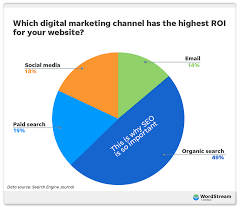Optimizing SEO: A Guide to Boost Your Online Visibility
In today’s digital age, having a strong online presence is crucial for the success of any business. Search Engine Optimization (SEO) plays a vital role in improving your website’s visibility and driving organic traffic. To maximise your SEO efforts and climb the search engine rankings, consider the following tips:
Conduct Keyword Research
Keywords are the foundation of SEO. Conduct thorough keyword research to identify relevant terms and phrases that your target audience is searching for. Use tools like Google Keyword Planner or SEMrush to discover high-traffic keywords with low competition.
Optimize On-Page Elements
Optimize your website’s on-page elements, including title tags, meta descriptions, headings, and image alt text. Ensure that your content is well-structured, relevant, and contains your target keywords naturally.
Create High-Quality Content
Content is king in the world of SEO. Create high-quality, engaging content that provides value to your audience. Regularly update your website with fresh and relevant content to keep both users and search engines coming back for more.
Improve Website Speed
A fast-loading website not only enhances user experience but also improves search engine rankings. Compress images, enable browser caching, and minify CSS and JavaScript files to boost your website’s speed.
Build Quality Backlinks
Backlinks from reputable websites are a strong signal of authority to search engines. Focus on building quality backlinks through guest posting, outreach campaigns, and creating shareable content that naturally attracts links.
Mobile Optimization
With the increasing use of mobile devices, it’s essential to optimize your website for mobile users. Ensure that your site is responsive, loads quickly on mobile devices, and provides a seamless user experience across all screen sizes.
Monitor Performance with Analytics
Track your SEO efforts using tools like Google Analytics to monitor key metrics such as traffic sources, user behaviour, and conversion rates. Analyse this data regularly to identify areas for improvement and adjust your strategy accordingly.
By following these tips and staying updated with the latest SEO trends and best practices, you can effectively optimize your website for search engines and improve your online visibility in today’s competitive digital landscape.
Mastering SEO: Your Essential Guide to Understanding, Implementing, and Optimising for Search Engines – 13 Key Questions Answered
- How do you optimize for SEO?
- What are the 4 stages of SEO?
- What is SEO and how to do it?
- How can I optimize my SEO for free?
- What does SEO optimization?
- Why should you optimize SEO?
- How SEO optimized is a website?
- What is being optimized in SEO?
- How do you optimize SEO?
- What is meant by SEO optimization?
- Is SEO optimization easy?
- What are the 3 types of SEO optimizations?
- What is SEO website optimization?
How do you optimize for SEO?
Optimizing for SEO involves a strategic approach to improving your website’s visibility and ranking on search engine results pages. To effectively optimize for SEO, start by conducting thorough keyword research to identify relevant terms that your target audience is searching for. Incorporate these keywords naturally into your website’s content, meta tags, and headings. Focus on creating high-quality, engaging content that provides value to users and encourages them to stay on your site. Additionally, ensure that your website is technically sound by optimizing page speed, mobile responsiveness, and internal linking structure. Building quality backlinks from reputable websites and regularly monitoring your site’s performance through analytics are also key aspects of successful SEO optimization strategies. By implementing these tactics and staying abreast of the latest SEO trends, you can enhance your online visibility and attract more organic traffic to your website.
What are the 4 stages of SEO?
Understanding the four stages of SEO is essential for implementing a comprehensive and effective search engine optimization strategy. The first stage, known as the ‘Crawl’ stage, involves search engines like Google discovering and indexing your website’s content. Next comes the ‘Index’ stage, where search engines store and organise the information found during the crawling process. Following this is the ‘Rank’ stage, where search engines evaluate and rank your website’s relevance to specific search queries based on various factors like keywords, content quality, and backlinks. Finally, in the ‘Results’ stage, users see your website in search results based on its ranking position and relevance to their query. By understanding and optimising each of these stages, businesses can enhance their online visibility and attract valuable organic traffic.
What is SEO and how to do it?
Search Engine Optimization (SEO) is the process of enhancing a website’s visibility on search engine results pages to attract organic traffic. It involves various strategies and techniques aimed at improving a site’s ranking in search engine algorithms. To do SEO effectively, start by conducting thorough keyword research to identify relevant terms that your target audience is searching for. Optimise your website’s on-page elements such as title tags, meta descriptions, and headings with these keywords. Create high-quality content that provides value to users and attracts backlinks from reputable sources. Focus on mobile optimization, improve website speed, and monitor performance using analytics tools to track progress and make necessary adjustments. By following these steps and staying informed about SEO best practices, you can enhance your online visibility and drive more traffic to your website organically.
How can I optimize my SEO for free?
Optimizing your SEO for free is indeed a common concern for many businesses looking to enhance their online visibility without breaking the bank. One cost-effective strategy is to focus on creating high-quality content that is relevant to your target audience and incorporates strategic keywords naturally. Additionally, leveraging social media platforms to promote your content and engage with your audience can help boost your SEO efforts without any financial investment. Regularly monitoring and analysing your website’s performance using free tools like Google Analytics can also provide valuable insights to refine your SEO strategy and improve your organic search rankings over time. By implementing these tactics diligently, you can effectively optimise your SEO without incurring any additional costs.
What does SEO optimization?
Search Engine Optimization (SEO) involves a range of strategies and techniques aimed at improving a website’s visibility on search engine results pages. SEO optimization encompasses various practices such as keyword research, on-page optimization, content creation, link building, and technical enhancements to enhance a site’s relevance and authority in the eyes of search engines. By implementing SEO best practices, businesses can increase their organic traffic, attract quality leads, and ultimately improve their online presence and visibility to target audiences.
Why should you optimize SEO?
Optimizing SEO is essential for businesses looking to enhance their online visibility and attract relevant traffic to their websites. By implementing effective SEO strategies, you can improve your search engine rankings, making it easier for potential customers to find your business online. A well-optimized website not only increases organic traffic but also enhances user experience, boosts brand credibility, and ultimately leads to higher conversion rates. Investing in SEO allows you to stay competitive in the digital landscape, reach a wider audience, and establish a strong online presence that drives long-term success for your business.
How SEO optimized is a website?
One frequently asked question in the realm of SEO is, “How SEO optimized is a website?” The level of SEO optimization of a website can vary based on several factors, including the quality of content, keyword usage, on-page elements, backlink profile, mobile-friendliness, site speed, and overall user experience. Conducting a comprehensive SEO audit can provide insights into the strengths and weaknesses of a website’s optimization efforts, allowing for targeted improvements to enhance its visibility and ranking on search engine results pages. Regular monitoring and adjustments are essential to maintaining a high level of SEO optimization and staying competitive in the ever-evolving digital landscape.
What is being optimized in SEO?
In the realm of SEO, the process of optimization revolves around enhancing various aspects of a website to improve its visibility and ranking on search engine results pages. When we talk about what is being optimized in SEO, it encompasses a wide range of elements such as on-page content, meta tags, site structure, images, backlinks, and overall user experience. By fine-tuning these components in alignment with search engine algorithms and user intent, businesses can effectively boost their online presence and attract more organic traffic to their websites. Ultimately, the goal of SEO optimization is to enhance a website’s relevance, authority, and usability to ensure it stands out amidst the digital competition.
How do you optimize SEO?
When it comes to optimizing SEO, the key lies in implementing a strategic approach that encompasses various facets of digital marketing. To enhance your website’s visibility and ranking on search engine results pages, you can start by conducting thorough keyword research to identify relevant terms and phrases. Optimizing on-page elements such as title tags, meta descriptions, and headings is essential for signalling search engines about your content’s relevance. Creating high-quality and engaging content regularly, improving website speed, building quality backlinks, focusing on mobile optimization, and monitoring performance with analytics are all crucial aspects of a comprehensive SEO strategy. By integrating these practices effectively, you can boost your online visibility and attract valuable organic traffic to your website.
What is meant by SEO optimization?
SEO optimization refers to the process of enhancing a website’s visibility and ranking on search engine results pages through strategic tactics and best practices. It involves various techniques such as keyword research, on-page optimization, content creation, link building, and technical improvements to ensure that a website is easily discoverable by search engines and provides a valuable user experience. By implementing SEO optimization effectively, businesses can attract more organic traffic, improve their online presence, and ultimately drive conversions and achieve their digital marketing goals.
Is SEO optimization easy?
The question of whether SEO optimization is easy is a common one among individuals navigating the realm of digital marketing. While the concept of SEO may seem straightforward on the surface, the execution can be complex and time-consuming. Effective SEO involves a combination of technical expertise, strategic planning, content creation, and continuous monitoring and adaptation. It requires a deep understanding of search engine algorithms, keyword research, competitor analysis, and user experience. While some basic SEO practices can be relatively simple to implement, achieving significant results and staying ahead in the ever-evolving landscape of search engine optimisation often requires dedication, patience, and ongoing effort.
What are the 3 types of SEO optimizations?
When it comes to optimizing SEO, there are three main types of optimizations that play a crucial role in improving a website’s visibility and search engine rankings. These include on-page SEO, off-page SEO, and technical SEO. On-page SEO focuses on optimizing individual web pages with relevant content, meta tags, and keyword usage. Off-page SEO involves building quality backlinks from external sources to enhance the website’s authority and credibility. Technical SEO deals with the technical aspects of a website, such as site speed, mobile-friendliness, and indexing issues, ensuring that search engines can crawl and index the site effectively. By incorporating all three types of SEO optimizations into your strategy, you can enhance your online presence and attract more organic traffic to your website.
What is SEO website optimization?
SEO website optimization refers to the process of improving various elements of a website to enhance its visibility and ranking on search engine results pages. This includes on-page factors such as keyword usage, meta tags, and content quality, as well as off-page factors like backlinks and site speed. By optimising these aspects in line with search engine algorithms, websites can attract more organic traffic, increase their online presence, and ultimately drive better results for their business. SEO website optimization is a continuous effort that requires strategic planning, regular monitoring, and adaptation to stay ahead in the ever-evolving digital landscape.




